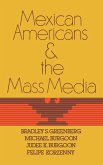Seminar paper from the year 1999 in the subject Communications - Movies and Television, grade: 1 (A), Ohio University (School of Telecommunication), course: Multicultural Broadcasting, language: English, abstract: MTV - an "all encompassing mediator of popular culture" (Goodwin, 1992) or as the Washington Post once put it "perhaps the most influential single cultural product of the [eighties]" (McGrath 1996, p. 8). A trademark that has become a synonym for modern television, fast moving pictures and even a certain lifestyle. 'MTV generation', 'MTV-like', 'I want my MTV' etc. But MTV is more than entertainment for teenagers and music with colorful pictures around it - It is not only the world's fastest growing network but also a powerful gatekeeper. Whoever makes it onto the playlist of the network can expect their CD sales to skyrocket and his concerts to be sold out. But the question is, is MTV giving everybody the same chance?This research paper deals with the question of how black people are represented in the music programming of MTV. Although MTV today features more game, quiz and celebrity shows and less music videos than it did in the 1980s, it can still be considered 'Music Television' and has 50 different titles in rotation each week. To find out more about the representation of African-Americans on MTV, the following hypotheses will be tested:H1: The percentage of black artists on MTV's playlist has increased significantly over the last decade with a particular strong increase in the middle of the 1990s.H2: The percentage of other minorities (like Asians, Hispanics, etc.) in contrast has not increased over the last 10 years.H3: The percentage of black artists on MTV's playlist is higher in February (Black History Month) than in another random month.In the first chapters, however, MTV's history will be briefly examined as well as its role as a strong gatekeeper in the music industry. Additionally, the big controversy that took place in the earlyyears of MTV, when several black artists protested the network's "impenetrable racial barrier" (Idowu 1999, p. 41) will be talked about.
Hinweis: Dieser Artikel kann nur an eine deutsche Lieferadresse ausgeliefert werden.
Hinweis: Dieser Artikel kann nur an eine deutsche Lieferadresse ausgeliefert werden.








